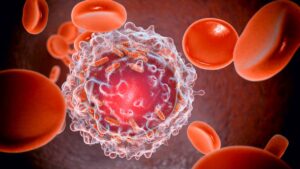Biotech doesn’t need another pandemic for a resurgence – it’s made a strong comeback regardless. Stockhead spoke with Andrew Chapman, head of Perth-based fundie Merchant Group – to learn why this is the case, and which are his top picks for the sector.
The global biotech industry has been pulling in a wave of funding of late, ending a two-year deal drought after interest in the sector waned post-pandemic eye of storm.
It’s been attracting big money in US equity markets in particular. And according to the FT, with an inflow of US$6.2bn in equity capital markets in January – per data from Jefferies – the money’s been piling in at the fastest rate since the peak of the mid-pandemic boom.
There’s big interest for Australian biotech innovation, too, as Merchant Group managing director Andrew Chapman attests.
In a recent chat with us, Chapman told Stockhead that biotech is a sector moving in the right direction globally, notably “coming off a super low base”.
And that means the timing could be very good indeed right now for ASX investors to take a closer look at the diversity and opportunities on offer in this complex and competitive sector that’s potentially highly rewarding in more ways than one.
Why has biotech made a comeback?
As of end of January, the Merchant Group Biotech Fund is up about 57% this financial year vs the Small Cap Index and the Healthcare 300 Index, correspondingly up about 10%.
Chapman puts its recent outperformance, and the biotech sector’s as a whole, down largely to macro conditions, and a surge of funding in the space in the US.
“With the view that interest rates may have peaked and likely to come down in 2024, I think risk-on investors are looking for diamonds in the rough and the best place to start in my view is always the most bombed-out sectors. So I think ultimately at the moment, the interest coming into the US market with M&A deals there for instance is now flowing through into Australia.”
Chapman says Merchant Group’s, and his own, interest in biotech is long-held. The sector has historically been a “happy hunting ground” for the firm, with an active view to investing in companies at a very early stage, such as Race Oncology (ASX:RAC), PolyNovo (ASX:PNV) and BCAL Diagnostics (ASX:BDX).
However, he admits the biotech, medtech and life sciences focused fund had a difficult first 12 months as the biotech market melted down from about February 2021.
“The overall timing on launching a fund focused on arguably the worst sector in the market was pretty average,” said Chapman.
The past six months have, though, recovered that initial lost ground and then some, with the fund well and truly back in positive territory for its investors.
What’s the biotech fund’s overarching strategy?
And adding to that question, how does Merchant Group decide which companies or technologies to invest in and what attributes and factors are important?
Regarding the primary strategy, it’s essentially one of “active investment”, said Chapman. And that means becoming involved with research helping to advise the the company as much as possible.
“We’re generally not ones to sit on the sidelines,” Chapman told us. “We look to take large stakes in companies with excellent management teams that we believe have unique assets and some type of moat around them.”
‘A really good CEO can make the science shine’
When considering biotechs, a particularly important consideration said Chapman – as much as the science itself, and cash balances for funding for at least 12-18 months – is companies with strong marketing management.
“For example, a poorly designed trial can have a huge adverse effect. If there’s a mistake there, all the amazing science in the world is not going to shine through,” the Merchant Group boss told us.
“This is where I come back to having the right commercially minded people who understand the science but also how to design trials appropriately in order to get the best results. It’s super important, and it’s where someone like Dr Tillett for RAC is exceptional. Board of IIQ, same story.
“A really good CEO can make the science shine, when a really good scientist won’t necessarily be able to make the company shine.”
How is the biotech fund diversified?…
… and how does it manage risks?
Chapman notes that at any one time the fund has a spread across sectors within the broader biotech space.
“At the moment we have about 20 positions in the portfolio and believe that spreading the risk across different companies within the space is the best option,” he said.
“This doesn’t mean, though, that in a broader sector downturn like we have seen from March 2021 to this year, we are immune from the chaos,” he caveated.
“We are very careful to not pull our flowers and water our weeds – meaning we will let the winners run and this is where we did really well in the past with companies such as RAC and PNV.”
Recent biotech winners
Right then, the juicy bits you’ve probably been waiting for in this piece – biotech stock success stories to date for the fund, and its top picks looking ahead. Some, have already actually been mentioned.
Starting with recent excellent performers, Chapman said the ones driving the fund’s success over the past few months include: Arovella Therapeutics (ASX:ALA), PharmAust (ASX:PAA), Neurotech (ASX:NTI), and Neuren Pharmaceuticals (ASX:NEU).
“These ones are have all been long-term holds, so they aren’t new additions, but they’ve all been winners of late,” he said, noting that the firm did sell out of NEU recently.
As for stocks that Chapman believes are primed for a rally in favourable conditions this year, he has four…
Merchant Group’s biotech picks for 2024
Inoviq is developing and commercialising next-generation exosome isolation tools and precision diagnostics to enhance detection and management of cancer and various other illnesses.
The company has commercialised the EXO-NET pan-exosome capture tool for research applications, as well as the hTERT test to complement urine cytology testing for bladder cancer.
IIQ is also developing blood-based tests for the early identification and monitoring of ovarian, breast, and other types of cancer.
Chapman tells us: “IIQ has had a recent board reshaping to now be the same board that was in place with us at PNV when it went from $0.15 to $3.00.
“The company has a very tight capital structure – with us and chairman David Williams the largest shareholders.
“Like I said before – excellent management teams but also IIQ has over the years developed next-generation diagnostics and therapeutics for cancer to save lives.”
Chapman also notes IIQ is well diversified – “so its isn’t a binary outcome like some biotechs’, where it’s a flip of a coin and all is riding on one tech or test,” adding:
“Less risk, excellent management and very far advanced tech is why we think we are only at the start of the movement in this stock. There is plenty of upside from here in my opinion.”
This clinical stage biopharmaceutical company makes drugs that are designed to treat cancer better with its lead asset, bisantrene (RC220), currently in Phase II trials for Acute Myeloid Leukemia.
“We’re about to start a series of new trials towards the second half of 2024 for solid tumours so basically all other cancers,” CEO Dr Daniel Tillett told Stockhead in a separate interview that delves into what’s coming up for the biotech stock this year.
“RAC – again another story of excellent management,” said Chapman.
“After a management break, Dr Tillett is back at the helm and is a great operator and as the largest shareholder has a lot of skin in the game.
“He understands the stock market also, so from an investor perspective is very backable. We believe a lot will happen in 2024 and will be the year of RAC.
“Results are imminent and again with a tight cap structure, we think the stock could run higher from here having peaked at $4.00 a couple of years ago and is now circa $0.80 – again a lot of upside from an already proven drug.”
Arovella is focused on developing its invariant Natural Killer T (iNKT) cell therapy platform for cancer treatment and continues to advance this tech towards first in-human clinical trials.
Arovella saw its share price more than double back in April last year after announcing its lead drug ALA-101 confers significant anti-tumour effect and survival benefit in aggressive leukemia models.
Clinical data indicated that ALA-101 has the potential to be a novel ‘off-the-shelf’ cell therapy to treat CD19-expressing leukemias and lymphomas.
“ALS will keep going,” said Chapman, “and I think could go a lot higher than here, given it’s one of, if not the, cheapest cell therapy stocks in the world.”
Neurotech, meanwhile, is following in the footsteps of 2023 biotech market darling Neuren Pharmaceuticals with another possible treatment for the rare neurological and developmental genetic disorder Rett syndrome.
Mid last year, NTI received Human Research Ethics Committee (HREC) approval and Clinical Trial Notification (CTN) scheme clearance by the Therapeutic Goods Administration (TGA) to investigate the use of NTI164 – the company’s proprietary cannabis-derived drug formulation – in female Rett Syndrome patients.
The progressive neurological disease occurs almost exclusively in girls, with an incidence of one in 10,000 female live births.
Its executive director Dr Thomas Duthy has been quoted as saying this equates to a US$2 billion market opportunity.
Regarding the company’s trial/testing, Chapman enthused:
“In all my years of biotech investing I have never seen a circumstance where people elect (and the authorities encourage) to stay on a trial after being on it for +90 weeks!
“This one’s a no-brainer and this I think will be a huge year for NTI. NEU is sitting at $3B market cap and NTI is at $100m – so massive upside if they get it right which I believe they will from here.”
IIQ, RAC, ALA and NTI share prices today:
Bonus narrative – medical cannabis
When asked about the most exciting investment narratives or sub-sectors within the biotech sphere, Chapman again pointed to the four ASX stocks listed above.
“I think all of the four companies mentioned are super exciting but not only from an investment perspective, they are exciting from a humanitarian perspective and this is what I really like about being involved in the space and hopefully making a difference to the outcomes of peoples lives.”
He also gave a bonus nod, however, to medical cannabis as a grouping that he thinks could – at last – make a move higher, too.
“Medical cannabis has been the worst-performing sector of the last three years, so it’s due some time in the sun soon. With positive changes coming in the US and Europe, it’s shaping up as one to watch, too.”
At Stockhead, we tell it like it is. While Race Oncology and Neurotech are Stockhead advertisers, they did not sponsor this article.
You might be interested in












